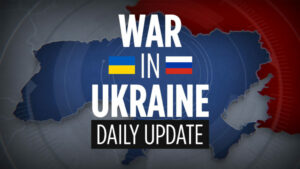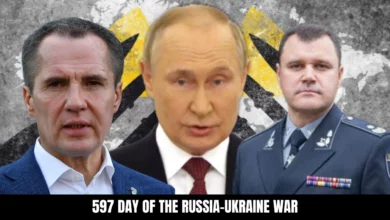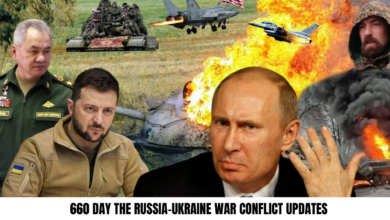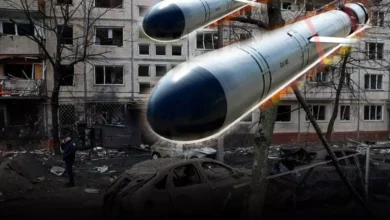Russian Passport Imposed In Occupied Ukraine
In the village where they lived, Vyacheslav Ryabkov and his parents were one of the few who had not yet obtained a Russian passport. However, the constant pressure to do so had become overwhelming.
After enduring three beatings from the occupying Russian soldiers in Ukraine’s Kherson region, Vyacheslav Ryabkov finally succumbed. Although his attackers had broken two of his ribs, his stoic expression in his passport photo, which was taken in September 2023, showed no signs of bruising.
During the month of December, he was apprehended while he was heading home after work. One of the assailants forcefully struck Ryabkov’s face with the butt of his rifle, causing significant damage to the bridge of his nose.
“Why aren’t you standing up for our rights? After all, you possess a Russian passport,” they questioned. Despite the 42-year-old losing consciousness, the assault persisted.
“Let’s complete this,” stated one soldier. A comrade hurried to Ryabok’s mother.
According to an Associated Press investigation, Russia has managed to forcefully distribute passports to the majority of the population in occupied Ukraine by creating a situation where survival is only possible with them. This has resulted in hundreds of thousands of people being coerced into obtaining citizenship, in preparation for elections which are guaranteed to be won by Vladimir Putin. However, accepting a passport also means that men living in occupied areas may be conscripted to fight against the very Ukrainian army that is attempting to liberate them.
Possessing a Russian passport is necessary for providing evidence of property ownership and maintaining eligibility for healthcare and retirement benefits. Failure to obtain one may lead to consequences such as losing custody of children, incarceration, or even more severe punishments. A recent legislation in Russia mandates that individuals residing in occupied territories must possess a Russian passport by July 1, or face imprisonment as a “foreign citizen.”
In addition, Russia provides various inducements, such as a monetary allowance for individuals to relocate from the occupied region and settle in Russia, humanitarian assistance, retirement benefits, and financial support for families with infants who possess Russian birth certificates.
The issuance of every passport and birth certificate becomes a hindrance for Ukraine in reclaiming its lost territories and citizens. On the other hand, Russia can exploit each new citizen as a means to justify their defense against an alleged hostile neighboring country, regardless of the truth.
According to the AP’s investigation, the Russian government has taken control of 1,785 properties in the Donetsk and Zaporizhzhia regions. The exiled Crimean leadership of Ukraine disclosed on February 25 that out of 694 soldiers killed in recent conflicts with Russia, 525 were believed to be Ukrainian citizens who had acquired Russian passports after the annexation.
According to the Associated Press, the method of granting Russian citizenship to individuals from occupied territories has been discussed with over a dozen people from these regions, including activists assisting them in leaving and government officials struggling to manage the complex and emotionally taxing situation.
According to Dmytro Lubinets, the human rights ombudsman of Ukraine, “nearly all” of the individuals who currently reside in the temporarily occupied territories of Ukraine have obtained Russian passports.
According to international law established in 1907, it is prohibited to compel individuals to pledge their loyalty to an enemy country. However, when Ukrainians request a Russian passport, they are required to provide biometric data and cell phone details, as well as take an oath of allegiance.
According to Kateryna Rashevska, a lawyer who assisted Ukraine in filing a war crimes lawsuit against Putin at the International Criminal Court, individuals living in occupied territories are the primary soldiers fighting against Ukraine. For them, it is reasonable to not sacrifice Russian citizens and instead utilize Ukrainians.
Amending legislation for Russian Passports
According to a news report, the tactic of utilizing both coercive and alluring methods in regards to Russian passports originated during the annexation of Crimea in 2014. It was during this time that individuals residing in Crimea were automatically granted Russian citizenship, and those who declined faced consequences such as loss of employment, access to healthcare, and ownership of property.
According to data released by the Russian government in 2015, 1.5 million Russian passports were distributed during the nine-month period of Russian control of the peninsula. However, Ukrainians claim that it remained feasible to operate without a passport for several years following this.
Starting in May 2022, Russia introduced a set of regulations to simplify the process of acquiring Russian passports for citizens of Ukraine. This was mainly achieved by eliminating the regular requirements of residency and income. However, in April 2023, consequences were imposed: Those living in the occupied regions who refused to obtain Russian citizenship would be deemed stateless and obligated to register with Russia’s Internal Affairs Ministry.
According to reports, Russian authorities have made threats to deny medical assistance to individuals who do not possess a Russian passport. Additionally, possession of a Russian passport has been deemed necessary in order to demonstrate ownership of property. As a result, numerous properties that were labeled as “abandoned” have been confiscated by the Russian government.
According to Oleksandr Rozum, a lawyer who assists Ukrainians living under occupation, the date on their passport can reveal their stance towards Russia. Those who acquired their passport before August 2022 are likely to be pro-Russian, while those who obtained it after that time were likely coerced. Rozum, who fled the occupied city of Berdyansk, aids his fellow citizens in navigating the bureaucratic complexities of living under occupation, such as retrieving important documents like property records, birth and death certificates, and divorce papers.
According to interviews with Ukrainian individuals and a review of the Telegram social media accounts created by occupation officials, the state of affairs varies depending on the caprices of the Russian authorities responsible for a specific region.
In a recent interview, Yevgeny Balitsky, the governor appointed by Moscow in Zaporizhzhia, stated that those who opposed the occupation would be expelled. He further explained that they recognized these individuals could not be convinced and would require even harsher treatment in the future. Balitsky hinted at making severe decisions that he did not wish to disclose.
Russian passports are being imposed on even young children
On January 4, Putin issued a decree that permits the acceleration of the citizenship process for Ukrainian orphans and children without parental care. This includes children whose parents were detained in occupied territories. The Ukrainian government reports that nearly 20,000 Ukrainian children have gone missing in Russia or Russian-controlled territories where they may be granted passports and adopted by Russian citizens.
According to Rashevska, the attorney working on the war crimes case, the issue at hand is the elimination of one’s identity.
According to the article , Natalia Zhyvohliad, a mother living in a suburb of Berdyansk, was well aware of the potential fate of her nine children if she chose to remain in the area.
According to Zhyvohliad, approximately half of the 3,500 residents in her town departed for Ukrainian-controlled territories shortly after. Some chose to leave voluntarily, while others were forced to travel a distance of 40 kilometers (25 miles) through the frontlines. On the other hand, some individuals in the town embraced the occupation, including Zhyvohliad’s goddaughter who eagerly obtained Russian citizenship, along with some of their neighbors.
According to her, there are many individuals similar to her, who are mockingly referred to as “waiters” by the Russians, who are hoping for a Ukrainian liberation. In order to preserve their Ukrainian heritage, she chose to keep her younger children, aged 7 to 18, at home and educate them in the Ukrainian language. However, when someone betrayed her, she was compelled to enroll them in the Russian school.
According to her, soldiers would knock on her door at any time and question her about her lack of a passport. A friend of hers eventually gave in, as she needed medication for a long-term illness. However, Zhyvohliad persisted through the summer, still not fully convinced of the consequences of deportation and the separation of her family to an orphanage in Russia or forced labor.
In the autumn of last year, the headmaster of the school compelled her two sons, aged 17 and 18, to enroll in the draft and instructed them to obtain passports in the interim. The principal presented them with the choice of either doing so or having to justify themselves to the internal security agencies of Russia.
A UN report revealed that by 2023, over 30,000 Crimean males had been compelled to join the Russian military after the annexation of the peninsula. Zhyvohliad was well aware of the dangers her sons faced.
With tears in her eyes and trembling legs, she made her way to the passport office.
During the occupation, she mentioned that she held onto a Ukrainian flag and wondered how she could obtain this unpleasant item.
Her intention was to utilize it only once, specifically at the final Russian checkpoint before entering the territory held by Ukraine.
Upon arriving at the filtration point in Novoazovsk, Zhyvohliad and her two eldest sons were separated from the other children by the Russians. In order to pass through, they were required to sign an agreement and undergo a lie detector test. Zhyvohliad was then taken aside by herself.
After 40 minutes, they inspected her mobile device, collected fingerprints and pictures, and interviewed her. However, they eventually allowed her to pass. Her children were eagerly anticipating her arrival. While she longs for her home, she has no remorse for her decision to leave.
The speaker revealed that she delayed her liberation until the final moments. However, the situation with her children potentially being drafted was the final issue that pushed her to take action.
The Utilization of Health Care for Harmful Purposes
The decision of life or death is frequently urgent.
According to officials of the Russian occupation, there will soon be a time when only individuals possessing Russian passports and crucial national health insurance will have access to medical treatment. This has already been implemented for some people.
According to Physicians for Human Rights, a global organization, there were a minimum of 15 instances between February 2023 and August 2023 where individuals were denied crucial medical treatment in occupied regions due to their lack of a Russian passport. In some cases, hospitals had a dedicated passport department to expedite the procedures for desperate patients. In the Zaporizhzhia oblast, a hospital was instructed to shut down after its medical personnel refused to acknowledge Russian citizenship.
The leader of Lazurne village in Kherson region, Alexander Dudka, who was appointed by Russia, initially issued a warning that he would not provide any humanitarian assistance to non-Russian citizens living in the village. Later in August, he also included medicine in the list of items that would be denied to non-Russian citizens.
According to the video posted on the village Telegram channel, the speaker emphasized that the residents should show proper reverence towards the nation that guarantees their well-being and is currently aiding in their livelihood.
Effective Jan. 1, individuals seeking medical treatment in the occupied area are required to provide evidence of mandatory national health insurance, which is exclusively accessible to Russian citizens.
According to Uliana Poltavets, a researcher at PHR, there were still opportunities for medical treatment last year if individuals were not afraid or pressured. However, this is no longer an option.
According to Dina Urich, a member of the organization Helping to Leave, approximately 400 requests are received each month for assistance in escaping occupied territory. However, due to limited resources and manpower, only 40 evacuations can be completed. Those with urgent medical needs are given priority. Additionally, individuals without Russian passports have been turned away by Russian soldiers at the final checkpoints.
According to her, individuals often pass away while awaiting evacuation because of inadequate access to medical assistance. She also mentioned that some individuals will choose to remain in this situation, resulting in psychological and physical distress. Some may even succumb to torture and persecution, while others will constantly live in fear.
Incorporating loyalty By Forcing Russian Passports
In addition to converting Ukrainians into Russians across the occupied regions, the Russian authorities are also importing their own citizens. They are providing highly attractive mortgage rates for individuals from Russia who are interested in relocating there, in order to replace the departed Ukrainian professionals such as doctors, nurses, teachers, police officers and municipal employees.
Following the start of the war when the Kherson region was in a state of uncertainty, many residents of Zhyvohliad’s village decided to leave. Others were forced to leave their homes and were sent across the frontline by occupation officials. As a result, half of the village’s population is no longer living there. The Russian-appointed replacement took over the school principal’s vacant house.
The port city of Mariupol suffered significant destruction to its homes due to both artillery and airstrikes. This occurred during the city’s prolonged siege by Russian forces, which eventually led to their takeover. As a result, many of the city’s inhabitants were forced to flee either to Ukrainian-held areas or into Russia. It is common for Russian forces to seize control of properties in these situations.
According to reports, Russia has extended an offer of “residential certificates” and a stipend of 100,000 rubles ($1,000) to Ukrainian individuals who are willing to become citizens and relocate to Russia. This proposal may seem appealing to those who are weary of the constant noises of war and apprehensive about the potential outcomes of the ongoing conflict.
Once again, this mirrors the steps taken by Russia following the annexation of Crimea. Through the settlement of Russian citizens in occupied areas, Russia solidifies its control over the territories it obtained through aggression, a tactic that is often viewed by Ukrainians as a form of ethnic purging.
The pace of the procedure is rapidly increasing. Russia quickly provided passports within days after seizing control of Adviivka town last month.
According to Rima Yaremenko, the town of Oleshky, located near Kherson, was significantly deserted due to the flooding caused by the explosion of the Kakhovka Dam. In comparison to the dangerous situation of shelling and rising waters, the housing allowance offered in Russia seemed much more appealing.
Rather than accepting it, she traveled through Russia to Latvia and eventually to Poland. However, she suspects that the Russians used this as an opportunity to expel the “waiters” from Oleshky.
According to her, perhaps their intention was to evacuate the city. It is possible that they took control of it with the belief that it would remain theirs indefinitely.
According to Ryabkov, he was presented with the opportunity to receive a housing stipend while completing his passport documentation, but he declined. However, he is aware of numerous individuals who chose to take advantage of the offer.
In December, when the Russian soldiers apprehended Ryabkov on the street, it was too late as everyone in his village had either left or acquired Russian citizenship. Upon his mother’s arrival, Ryabkov was unrecognizable due to the amount of blood and the Russian guns pointed at him. In a desperate attempt, she threw herself over his body to protect him.
She challenged them to shoot him by going through her.
The elderly woman was spared from being shot as they couldn’t bring themselves to do it. Eventually, she was able to convince him to return home. The following day, they began making arrangements to depart.
Despite the length of time it took, they were successful in escaping with the aid of their Russian passports.
After catching sight of our flag with its combination of yellow and blue, he admitted, “Tears came to my eyes.” He then expressed a strong desire to destroy and discard his Russian passport.
Source : In Paris, Hinnant provided the report. Illia Novikov and Susie Blann, journalists from AP, also made contributions to this report.








